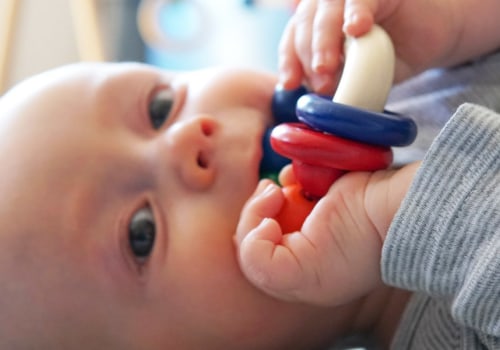As an expert in child development, I have seen firsthand the importance of play in a baby's growth and development. One of the most common questions I receive from parents is when their babies can start playing with wooden toys. The answer is not a simple one, as it depends on the type of wooden toy and the age of the baby. In this article, I will discuss the benefits of wooden toys for babies and when it is appropriate for them to start playing with them.
The Beginning of Gross Motor Skills
From a very young age, babies are naturally curious and eager to explore their surroundings.This is when they start developing their gross Motor Skills, which involve using their large muscles to move and interact with objects.
Wooden toys
are perfect for this stage of development as they are easy to grasp, hold, and shake. For example, wooden rattles can be introduced to babies as young as 3 months old, providing them with a fun and safe way to practice their motor skills. As babies grow older, they can start playing with more complex wooden toys such as blocks and pull or push toys. These types of toys are usually recommended for children over 6 months old, as they require more advanced motor skills to play with.It is important to note that wooden toys for children under 3 years old should not contain small parts or accessories that could be a choking hazard.
The Role of Imitation Toys
Once children reach the age of 3, they can start playing with imitation wooden toys, such as toy kitchens or doll houses. These types of toys are known to promote imaginative play and help children develop their social and emotional skills. However, it is crucial to pay attention to the recommended age for each toy, as some imitation wooden toys may not be suitable for children under 2 years old due to small parts. One of my favorite wooden toys for babies is the MORI wooden grip toy. This toy is not only safe for babies but also helps them develop their motor skills and hand-eye coordination.Its simple design allows children to use their imagination and play in their own unique way.
The Importance of Open Play
While younger babies may interact with toys in a more basic way, such as shaking a rattle, it is not until after 6 months that they start playing with toys in a more conventional sense. This is when they start throwing blocks, rolling a ball, or cuddling with a teddy bear. As a Montessori practitioner, I strongly believe in allowing toddlers to explore toys and objects in their own way. For infants and toddlers, this may involve repeating actions such as putting toys in their mouth, throwing them, or rolling them. When it comes to choosing toys for your baby, it is important to consider sustainability.Investing in fewer but better quality toys can have a positive impact on your child's development. Wooden toys are a great option as they offer endless possibilities for open play and can last for years.
The Versatility of Wooden Toys
One of the best things about wooden toys is their versatility. Take the MORI rainbow wooden stacker, for example. Its minimalist design encourages children to use their imagination and creativity to the fullest.This toy can be used in various ways, making it a great investment for parents. During the newborn stage, playtime and quality time are one and the same. Simply holding, touching, and talking to your baby can provide them with all the entertainment they need. However, as they reach the 4-month mark, they will start enjoying holding and shaking toys like a rattle, as well as playing with hanging toys on a play mat.
The Role of Wooden Toys in Cognitive Development
Imitating adults and creating their own play worlds is an important part of a child's development. This promotes their imagination and helps them develop their cognitive skills.Additionally, children enjoy singing with others as they start paying attention to each other's singing and try to sing at the same pace. When it comes to choosing wooden toys for your baby, look for ones that have cut-out areas and narrower parts, such as wooden keys or rattles. These types of toys are easier for babies to grip and play with.
The Safety of Wooden Toys
As an expert in child development, I can confidently say that wooden toys are safe for babies. They are made from natural materials and do not contain any harmful chemicals or toxins. This makes them a great option for parents who are looking for safe and eco-friendly toys for their little ones. Moreover, the open nature of wooden toys allows children to create their own ways of playing and spending more time with just one toy.This not only promotes creativity but also supports cognitive milestones in ways that flashy toys cannot.



